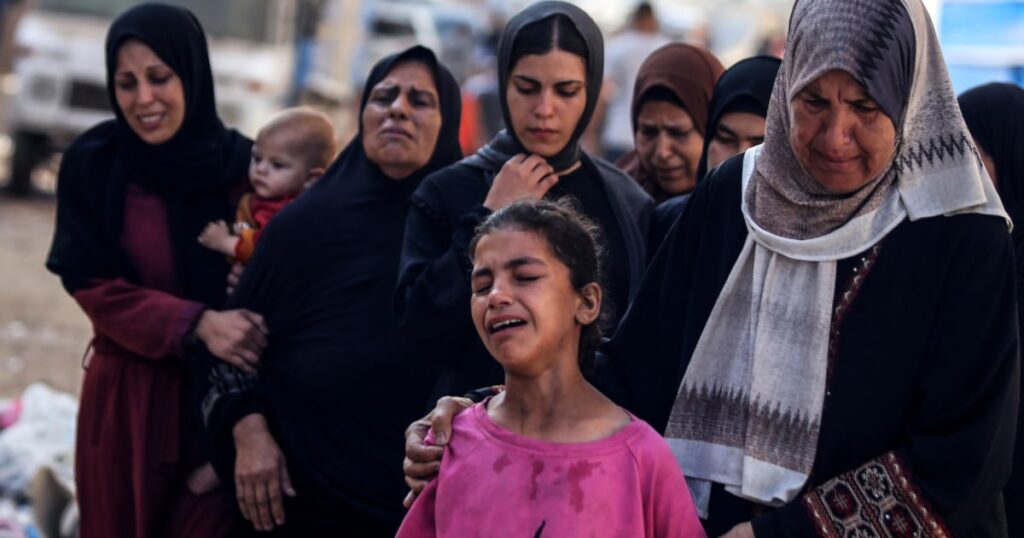
More than 150 charities and aid organizations have called for the termination of the U.S.- and Israel-backed Gaza Humanitarian Foundation (GHF). These groups, including prominent names like Oxfam, Amnesty International, and Save the Children, have accused Israeli forces and armed groups of “routinely” opening fire on Palestinians seeking aid. In a joint statement released on Tuesday, they reported that over 500 Palestinians have been killed and nearly 4,000 injured within a span of less than four weeks while attempting to access or distribute food in Gaza.
The organizations criticized GHF’s operational strategy, which they claim forces approximately 2 million starving individuals to navigate perilous terrains and active conflict zones to reach militarized distribution sites. At these sites, they reportedly have to “fight” for limited food supplies in what has been described as “chaotic enclosures.” The statement labeled these areas as “death traps,” citing repeated massacres in violation of international humanitarian law.
International Condemnation and Local Impact
The Palestinian Ministry of Health echoed these concerns, reporting that 583 people have died since the GHF began operations in Gaza in late May, following a three-month Israeli blockade on aid distribution. Accusations of deliberate firing by the Israeli military at aid recipients have been a near-daily occurrence, though the Israel Defense Forces (IDF) have denied these claims.
The United Nations has also condemned the GHF aid system. Secretary-General António Guterres described it as “inherently unsafe” during a statement on Friday. Israel, defending the GHF, claims it provides direct assistance to Palestinians while circumventing Hamas interference. In response to the reports of civilian harm at aid sites, Israel stated on Monday that it would “examine” these reports and implement new fencing and signage to improve access.
“These areas have become sites of repeated massacres in blatant disregard for international humanitarian law,” the charities stated.
Political Tensions and Diplomatic Efforts
The controversy over the GHF comes as Israeli Prime Minister Benjamin Netanyahu prepares to meet with U.S. President Donald Trump in Washington next week. This meeting, confirmed by a White House official to NBC News, occurs amid mounting pressure to end the ongoing conflict in Gaza. Netanyahu expressed his intentions to discuss a range of issues, including a trade agreement and the recent military operations.
President Trump has been vocal on social media, urging both sides to advance stalled ceasefire talks. “MAKE THE DEAL IN GAZA. GET THE HOSTAGES BACK!!!” he posted, emphasizing the urgency of negotiations.
Historical Context and Recent Developments
The GHF was established following a two-month ceasefire that collapsed in March after Israel resumed its military assault on Gaza, imposing an 11-week total aid blockade. This led to the reduction of hundreds of aid distribution points across Gaza, previously managed by the U.N., to just four sites operated by GHF. Reports of deadly incidents at these sites have been frequent, with the Israeli military acknowledging involvement in many cases, often citing self-defense or unauthorized area breaches.
Meanwhile, Israeli airstrikes on Gaza continue unabated. On Monday, an Israeli strike hit a seaside café in Gaza City, resulting in over 30 deaths. The Baqa Café, a popular spot for journalists, was obliterated, with video footage showing the aftermath of the attack.
“We heard the blast and ran. I’ve never seen anything like it. Blood everywhere,” said Salam Abu Hasir, the café’s manager.
Looking Ahead: Potential Outcomes and International Reactions
The ongoing situation in Gaza, exacerbated by the controversial aid distribution system, remains a focal point of international concern. As diplomatic efforts continue, the global community watches closely, hoping for a resolution that prioritizes humanitarian needs and respects international law.
With Netanyahu’s upcoming visit to the U.S. and the potential for renewed negotiations, the future of aid distribution in Gaza hangs in the balance. The international community, including the United Nations and numerous humanitarian organizations, continues to advocate for a safer, more effective system that ensures aid reaches those in need without further loss of life.






